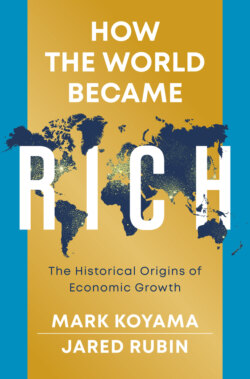Читать книгу How the World Became Rich - Mark Koyama - Страница 15
What This Book Does Not Do
ОглавлениеFor all we are attempting to accomplish with this book, we want to be clear about a few things we will not do. First, our goal is to present all of the major arguments on “how the world got rich” in a fair-minded fashion. This means that, when initially presenting the theories, we will do our best to not let our own biases creep in. We certainly have views on the various issues presented in the book, and we do think that some views are more convincing than others. The later chapters of the book lay out the reasons we believe some of the proposed causes in the literature have greater explanatory power than others. However, we aim to give each of the main explanations a fair shake and present them, to the best of our ability, the way that the authors of the theories would want them presented.
This book is thematic and conceptual. We elucidate the major themes running through the academic literature and contextualize them in a digestible manner. As such, we won’t present a comprehensive economic history of specific countries. Such histories can be extremely valuable. In some cases, they shed light on important aspects of the origins of economic growth. We pay particular attention to developments in Great Britain in the 18th and 19th centuries. But this is simply due to the fact that we are seeking to understand the origins of modern, sustained growth, and Great Britain was the locus of the first modern economy. We also pay attention to places that failed to be the center of the first modern economy – despite a head start relative to Western Europe – such as China and the Middle East. We do not provide a deep dive into the specifics of the economic histories of these regions. Instead, we selectively choose various aspects of their histories to help substantiate theories espoused in the literature.
Finally, we do not spend much time discussing the drawbacks to economic growth such as pollution, climate change, and the capacity to create deadly weapons. We are by no means denying the importance of these topics, but these issues are simply outside the scope of this book. We have written a book on the origins of modern economic growth. While we believe economic growth in general to be a good thing, the focus here is on what caused economic growth, not its consequences.
